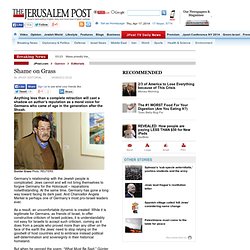

Gunter Grass's Controversial Poem About Israel, Iran, and War, Translated - Heather Horn - International. The German Nobel laureate denounced Israel's nuclear weapons, and was in turn denounced by the Israeli Prime Minister. Günter Grass at a 2006 book reading. AP On Wednesday, Nobel-winning German writer Günter Grass published a poem denouncing Israel's nuclear program and aggression toward Iran. The poem, in which Grass says he has kept silent on the issue for fear of being labeled anti-Semitic, has. The moral blindness of Gunter Grass. Shame on Grass - JPost - Opinion - Editorials. Germany’s relationship with the Jewish people is complicated.

Jews cannot and will not bring themselves to forgive Germany for the Holocaust – reparations notwithstanding. At the same time, Germany has gone a long way toward facing its dark past. And Chancellor Angela Merkel is perhaps one of Germany’s most pro-Israeli leaders ever. As a result, an uncomfortable dynamic is created: While it is legitimate for Germans, as friends of Israel, to offer constructive criticism of Israeli policies, it is understandably not easy for Israelis to accept such criticism, coming as it does from a people who proved more than any other on the face of the earth the Jews’ need to stop relying on the goodwill of host countries and to embrace instead political self-determination and sovereignty in their historical homeland. In “What Must Be Said,” Grass claims that it is Israel, not the fanatic Shi’ite mullahs of Iran, that “endangers an already fragile world peace.”
Gunter Grass' poem is more pathetic than anti-Semitic. Israelis can be angry with Gunter Grass, but they must listen to him.